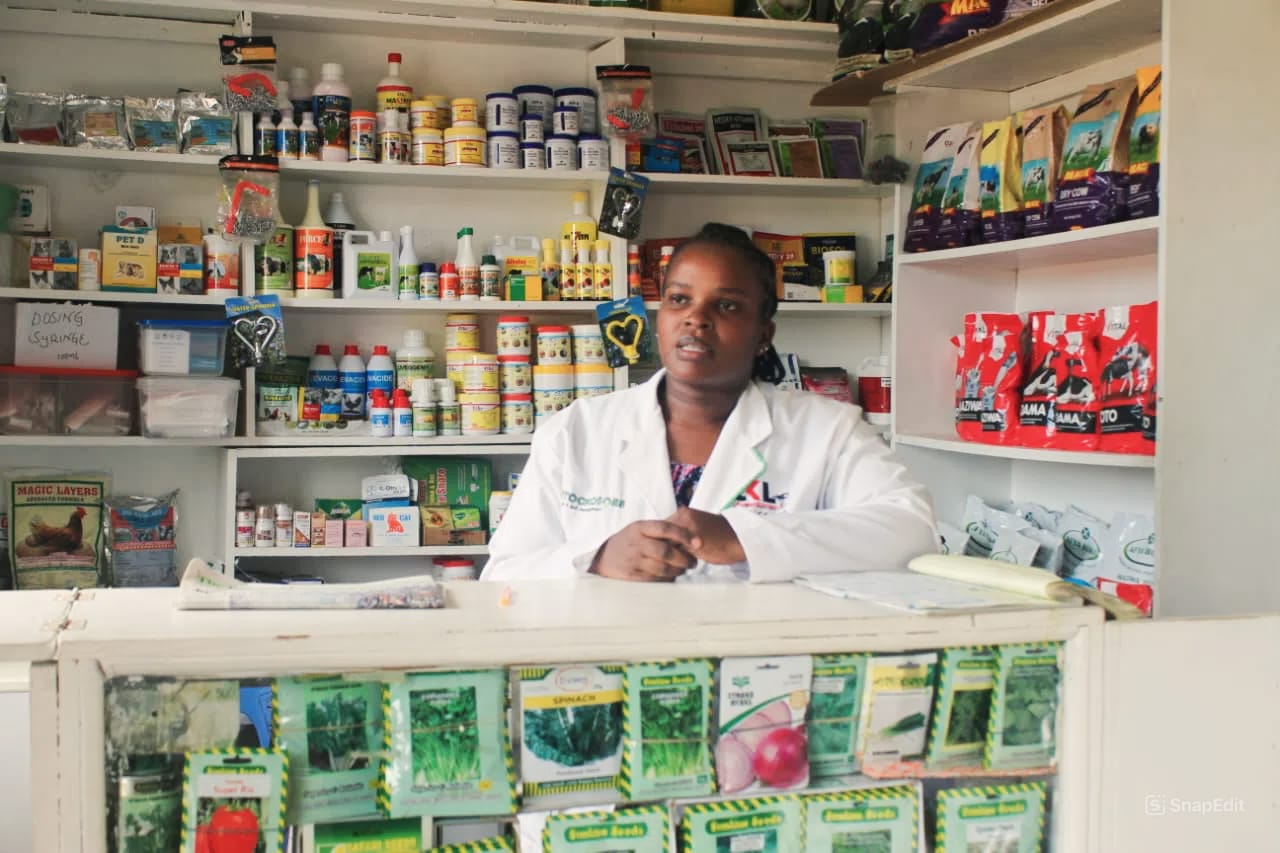 Pauline Mureithi, the Managing Director of Serenity Agrovet Stores, turned to Grassroots Business Fund, an impact investment organisation, after failing to secure working capital for the business her husband started from banks.
Pauline Mureithi, the Managing Director of Serenity Agrovet Stores, turned to Grassroots Business Fund, an impact investment organisation, after failing to secure working capital for the business her husband started from banks.After completing her training in veterinary health at the
university in 2018, Pauline Mureithi joined her husband in running a business
which he had started in 2015, dubbed Serenity Agrovet Stores.
At the time, the business, which deals with animal health
products, animal feeds, feeding equipment and agro-inputs, needed an injection
of capital to move to a location that was closer to their customers.
“Our business was located in Juja town, where there were not
very many farmers and so business was not doing so well. We even contemplated
shutting down,” said Pauline, the Managing Director of Serenity Agrovet Stores.
Fortunately, a client of theirs, who sympathised with their
situation, suggested they move to Juja farm, where they would be closer to
small-holder farmers, and even offered them some space to set up their shop.
Unfortunately, the entrepreneurs did not have the financial
muscle to move to the new location, and most of the financial institutions that
could help had too many requirements which they could not meet.
“When I tried to get a loan from my Sacco, where I had saved
for some time, they still asked me to pay some more money upfront, to cater for
insurance and the paperwork,” said Pauline.
Upon doing her calculations, the veterinarian realised that
the amount of money she was going to pay to access the loan was more than any
dividend she had received; therefore, she decided to withdraw all her savings
from the Sacco, a lengthy process that took almost three months to complete.
She invested what she got into the business, then reinvested
whatever profits she made back into the business. This enabled them to
organically grow, and by 2021, they were selling in a day what they would sell
in a month in 2018.
“When we started to grow, the larger banks agreed to give us
credit to expand, but now the issue was their credit was expensive. Our profit
margin is 13 to 15 per cent, but their interest rates were 16 per cent, so where
could we get the extra money to pay them?” stated Pauline.
Fortunately, through her networks, Pauline learnt about the
Grassroots Business Fund (GBF), a global impact investment organisation whose
mission is to grow startup businesses to generate sustainable earnings.
“At interest rates of around nine per cent, their loans were
way more affordable, which was good for business because if you made anything
above 10 per cent then it meant that you could easily pay them,” said Pauline.
In addition, the entrepreneur notes that their application
process was not bureaucratic. While they also had to do their due diligence,
they did not waste their beneficiaries’ time in a lot of paperwork or back and
forth.
Under the GBF Jiinue Growth Program, Pauline also learnt
about other key elements of running a successful business, such as accounting
and the importance of having a strategic plan, through a mentor.
“One of the things the mentor, Naomi, made us think about is how do we grow our business beyond Juja farm? Yes, we may have a working
model, but how do we grow our business to employ more people,” said Pauline.
From a one-room store, the business, Serenity Agrovet
stores, now accommodates four times the space it accommodated when they started
out. The firm has grown its workforce from one shop attendant to seven
permanent and three part-time staff.
As they sell products which are hazardous in nature, the
company also provides free advisory services, to avoid situations where
customers overdose, underdose, or expose their animals to harmful chemicals.
“We also do a bit of extension services where we go to the
field, though at the moment we are not very big on that, but we are considering
expanding in that area as well,” said Pauline.
The company is looking to have at least five more branches
in other towns across the country by 2030, before expanding across the borders,
even as they endeavor to reach more farmers in the Juja area which is growing.
Pauline’s advice to anyone looking to venture into
entrepreneurship is to start with the little they have, uphold good customer
care practices after they start, and above all, put God first in all they do.
“It is cheaper to get customers through referrals than
through marketing, which is why good customer service is key. It could be small
things like ensuring if a client asks for something today, they find it
tomorrow, or when they come to your shop, they have a place to sit, or just
being polite to your customer,” explained the entrepreneur.












